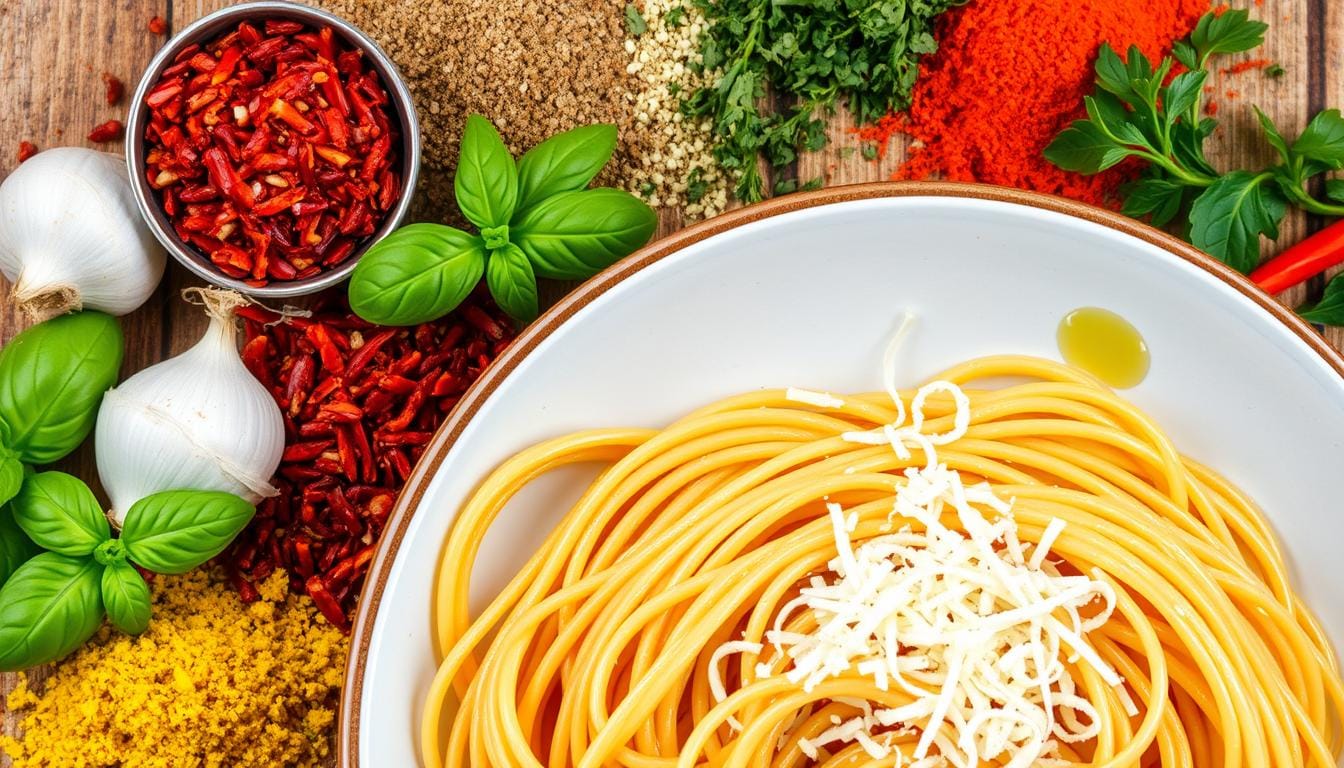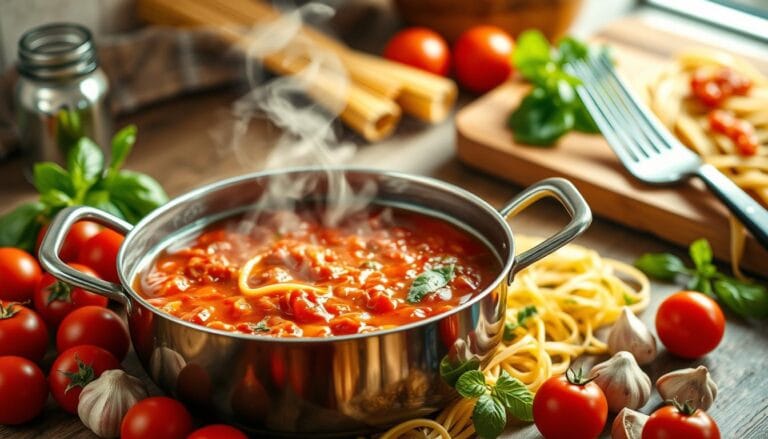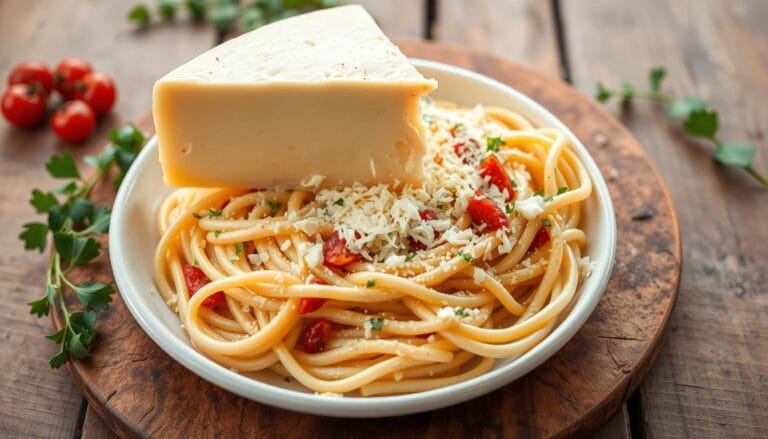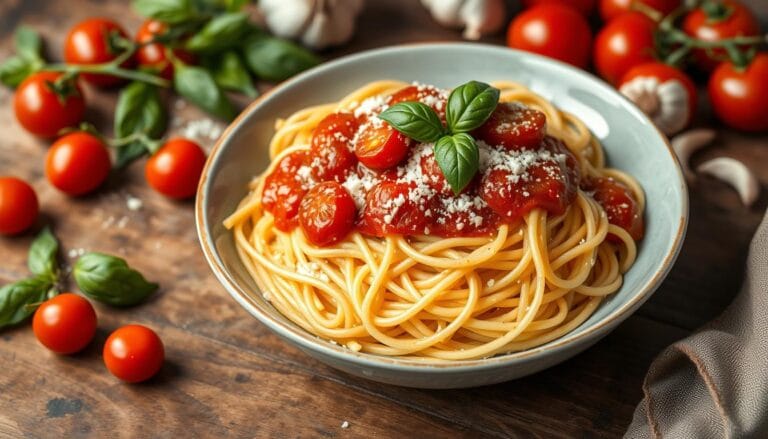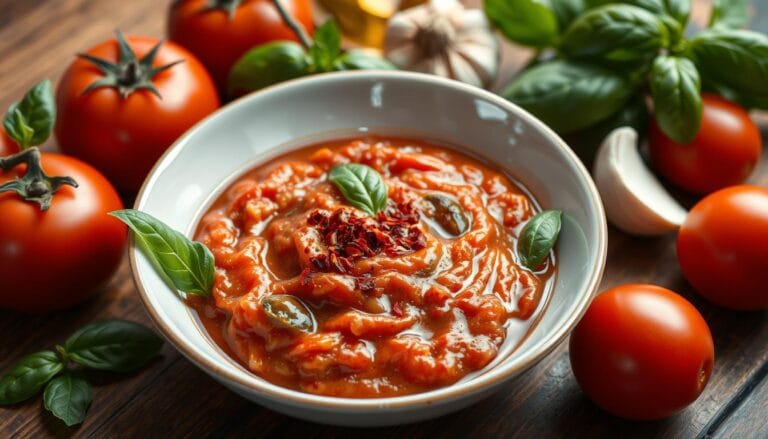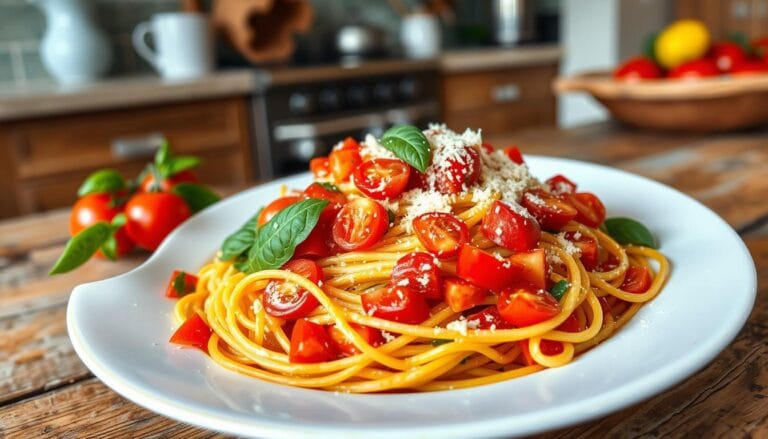Best Seasoning in Spaghetti for Enhanced Flavor
Table of Contents
I’ve always wanted to make my spaghetti dishes taste like they’re from a restaurant. I found that the right seasoning is key. The right mix of herbs and spices can turn a simple spaghetti dish into a feast for the taste buds.
Seasoning in spaghetti is the magic that makes your homemade sauce pop. Finding the perfect seasoning blend can elevate your sauce. It works whether you’re making your sauce from scratch or using a store-bought one.
In this article, we’ll explore the world of seasoning in spaghetti. We’ll look at the essential herbs, spices, and techniques to enhance your pasta dishes. You’ll learn about the role of seasonings in Italian cooking and how to layer flavors. Get ready to take your homemade spaghetti to new heights.
Understanding the Importance of Proper Seasoning in Spaghetti
In Italian cooking, seasonings are key to making spaghetti sauce taste great. They balance tomato acidity and boost the dish’s flavor. The right mix of spices and herbs turns a simple pasta into a memorable meal.
The Role of Seasonings in Italian Cuisine
Seasonings are the heart of Italian cooking, adding depth to every dish. Spaghetti sauce gets its unique taste from a special mix of herbs and spices. San Marzano tomatoes, known for their quality, are the base. Charred tomato paste and a bit of sugar balance the sauce’s acidity, creating a rich, smoky flavor.
Impact on Flavor Development
The seasonings used in spaghetti sauce greatly affect its taste. Ingredients like carrots help reduce sourness and smooth out the texture. Even small additions, like a bit of coffee or baking soda, can deepen the sauce’s flavor.
Basic vs Enhanced Seasoning Approaches
A basic seasoning in spaghetti recipe might use basil and oregano. But, adding secret ingredients can take it to the next level. Nutmeg brings an earthy taste, while butter adds richness. These advanced techniques help create a sauce that truly captures the spirit of Italian cooking.
Essential Dried Herbs for Perfect Spaghetti
Creating the ultimate spaghetti sauce is all about the right mix of dried herbs. These herbs add a true Italian taste and boost the flavor. The top herbs for seasoning spaghetti are oregano, basil, rosemary, thyme, and sage.
Oregano gives a strong, earthy flavor that’s key to spaghetti sauce. Basil adds a sweet and peppery taste that pairs well with tomato sauce. Rosemary brings a woodsy aroma that complements the other herbs. Thyme adds a subtle lemony flavor, while sage adds a nutty and peppery taste.
Dried herbs are better for seasoning spaghetti because they pack more flavor and last longer than fresh herbs. Mixing these five herbs in the right amounts creates a seasoning blend that makes your spaghetti sauce stand out.
Proper Ratios for Seasoning in Spaghetti
For 4 cups or 1 quart of spaghetti sauce, use 2 to 3 tablespoons of the seasoning mix. This blend is made to enhance spaghetti noodles’ flavor. You can adjust the amount to your liking.
The homemade spaghetti sauce spice can stay fresh for up to six months if stored right. You can also freeze it for up to six months. This way, you’ll always have the perfect seasoning ready for your next spaghetti dinner.
The Power of Garlic and Onion Powders in Pasta Dishes
Garlic and onion powders are key in making the best spaghetti sauce. They add a rich, savory taste. These powders are easy to use and give a consistent flavor, making them great for your seasoning in spaghetti.
Proper Measurements for Optimal Taste
To get the most out of garlic and onion powders, use the right amount. Start with about 1 tablespoon of each for your recipe. This helps your sauce have the right mix of garlic and onion without overpowering other flavors.
Fresh vs. Powder Forms Comparison
Fresh garlic and onions give a stronger, more aromatic taste. But, the powdered versions are easier to use and consistent. They’re perfect for quick weeknight meals. Save fresh alliums for special times when you want a stronger garlic or onion flavor.
| Ingredient | Fresh | Powder |
|---|---|---|
| Garlic | Robust, pungent flavor | Consistent, concentrated taste |
| Onion | Intense, aromatic notes | Convenient, evenly distributed |
Choosing fresh or powder forms, using garlic and onion wisely can make your spaghetti sauce amazing. It opens up new possibilities in your seasoning in spaghetti recipe.
Creating the Perfect Base with Seasoning in Spaghetti
Making the perfect spaghetti sauce starts with a solid base. The secret is in seasoning it right. This sets the stage for the whole dish. By using quality ingredients and the right seasoning, you can make your spaghetti sauce taste amazing.
Start with high-quality canned tomatoes, like San Marzano. These tomatoes give your sauce a real Italian taste. To add depth, char the tomato paste with olive oil before mixing it in. This step adds a smoky flavor that goes well with the tomatoes’ sweetness.
Seasoning is key to a balanced base. Use dried herbs like oregano, basil, and rosemary for that classic Italian taste. Garlic and onion powders add a savory depth. Find the right mix to match your taste.
“The secret to a truly exceptional spaghetti sauce lies in the seasoning. It’s the foundation upon which all the other flavors build.”
A good base makes the rest of your sauce shine. It lets all the flavors come together for a delicious dish. Remember, the art of seasoning is about finding the perfect balance to make your sauce stand out.
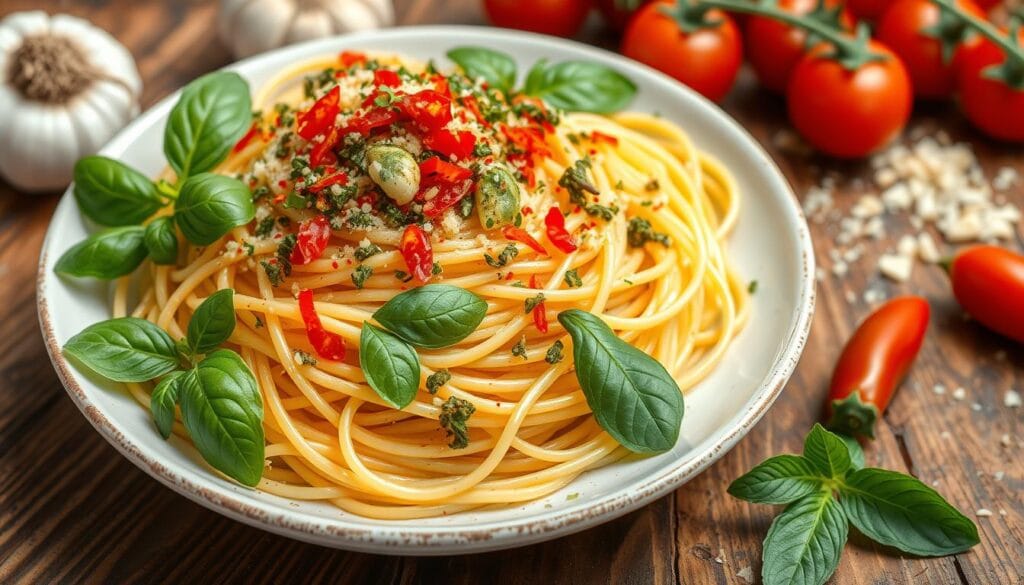
Secret Ingredients That Elevate Your Sauce
Creating the perfect spaghetti sauce is all about the unexpected ingredients. These hidden gems can take your sauce to new levels. Professional chefs use them to elevate the flavor.
Unexpected Flavor Enhancers
- Sugar – A bit of sugar balances the acidity of tomatoes, making the flavor more rounded.
- Carrots – Grated carrots add sweetness and adjust the sauce’s pH for a smoother taste.
- Instant Coffee – A small amount of instant coffee powder adds a rich, earthy depth to the sauce.
- Baking Soda – A pinch of baking soda reduces bitterness, making the sauce more balanced.
- Nutmeg – A dash of freshly grated nutmeg adds a warm, sweet, and woodsy aroma that complements other flavors.
Professional Chef Recommendations
Italian chefs recommend adding a pat of butter at the end for a silky texture. They also suggest using high-quality, imported Italian tomatoes for a robust flavor. These additions make your spaghetti dishes unforgettable.
“The secret to a truly exceptional spaghetti sauce lies in the nuanced balance of flavors – a touch of sweetness, a hint of bitterness, and a rich, earthy depth that comes from unexpected ingredients.”
By trying these secret ingredients, you can make your spaghetti sauce stand out. Impress your family and friends with your cooking skills. Explore the art of flavor layering and enhance your spaghetti dishes.
Balancing Flavors: Sweet and Savory Elements
Making the perfect spaghetti sauce is about finding the right mix of sweet and savory. Tomatoes’ acidity can be balanced with a bit of sugar or the sweetness of carrots. Meanwhile, garlic, onion, and herbs add a savory depth that complements the pasta well.
Understanding umami flavors is key to this balance. Parmesan cheese or anchovy paste can add a savory, umami taste. This adds complexity to the sauce. By mixing sweet, salty, sour, bitter, and umami tastes, you can make a sauce that excites your taste buds.
Mastering this balance takes practice and knowing what you like. Start by adjusting sugar or carrots to balance tomato acidity. Then, add savory elements until you find the perfect mix. The goal is a sauce that lets spaghetti and other ingredients shine.
| Flavor Element | Role in Spaghetti Sauce | Examples |
|---|---|---|
| Sweet | Balances acidity, enhances other flavors | Sugar, carrots, onions |
| Savory (Umami) | Provides depth and complexity | Garlic, dried herbs, Parmesan cheese, anchovy paste |
| Sour | Adds brightness and tang | Tomatoes, vinegar |
By mastering the balance of sweet and savory in your spaghetti sauce seasoning, you open up a world of flavors. Try different ingredients and adjust seasonings to find the perfect seasoning in spaghetti for you.
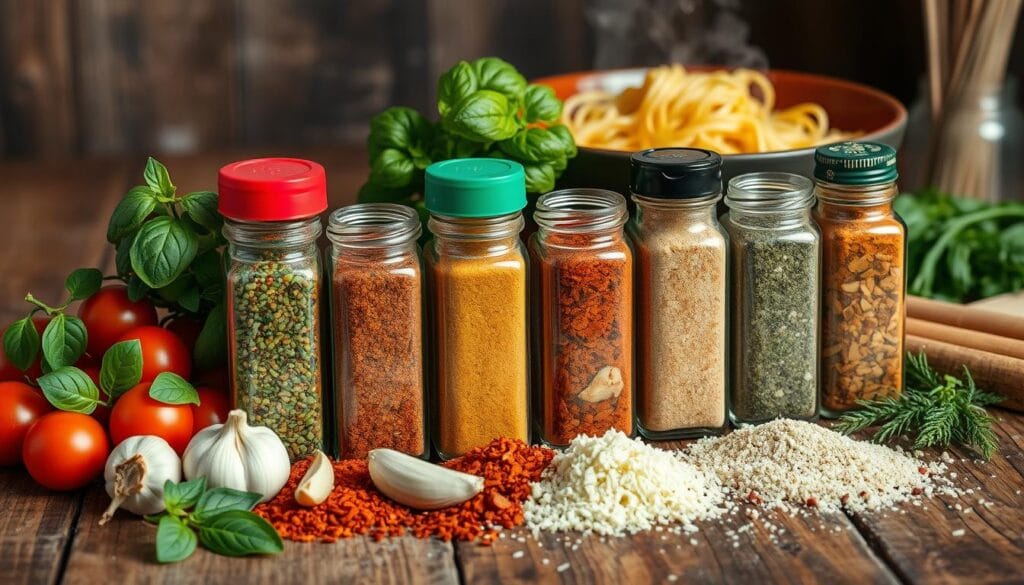
Traditional Italian Spice Combinations
Spaghetti and other Italian dishes get their authentic taste from special spice mixes. These mixes vary from the mild herbs of Northern Italy to the bold flavors of the South. Each region has its own spice blend that makes its dishes unique.
Regional Variations in Italian Seasoning
In Sicily, sauces often mix basil, oregano, and garlic for a fragrant taste. Tuscan dishes use earthy rosemary and sage. Fennel seeds add a special anise-like smell to many Italian spice blends.
Authentication Through Spices
These spice mixes do more than just flavor your spaghetti seasoning recipe or best spices for spaghetti sauce. They also make your dish taste like it’s from Italy. Using the right herbs and spices takes your spaghetti sauce to the heart of Italy, making it truly authentic.
“The beauty of Italian cuisine lies in its simplicity and respect for quality ingredients. By embracing traditional spice combinations, you can unlock the true essence of authentic Italian flavors.”
Heat and Spice: Adding Depth to Your Sauce
Adding heat and spice can really make your spaghetti sauce stand out. Red pepper flakes add a warm touch, while black pepper gives a subtle kick. For more heat, try cayenne or crushed red pepper.
It’s important to balance the spiciness with other flavors. Mix herbs and spices to find the perfect mix. The secret to a great sauce is the mix of heat, sweetness, and savory flavors.
| Spice | Impact on Spaghetti Sauce | Recommended Amount |
|---|---|---|
| Red Pepper Flakes | Adds a mild, warming heat | 1/4 to 1/2 teaspoon per 24-ounce jar |
| Black Pepper | Enhances overall flavor with a subtle kick | 1/2 to 1 teaspoon per 24-ounce jar |
| Cayenne Pepper | Delivers a more intense, fiery heat | 1/8 to 1/4 teaspoon per 24-ounce jar |
Start with a small amount of spice and add more as you like. Trying different amounts helps you find the perfect flavor for your sauce.
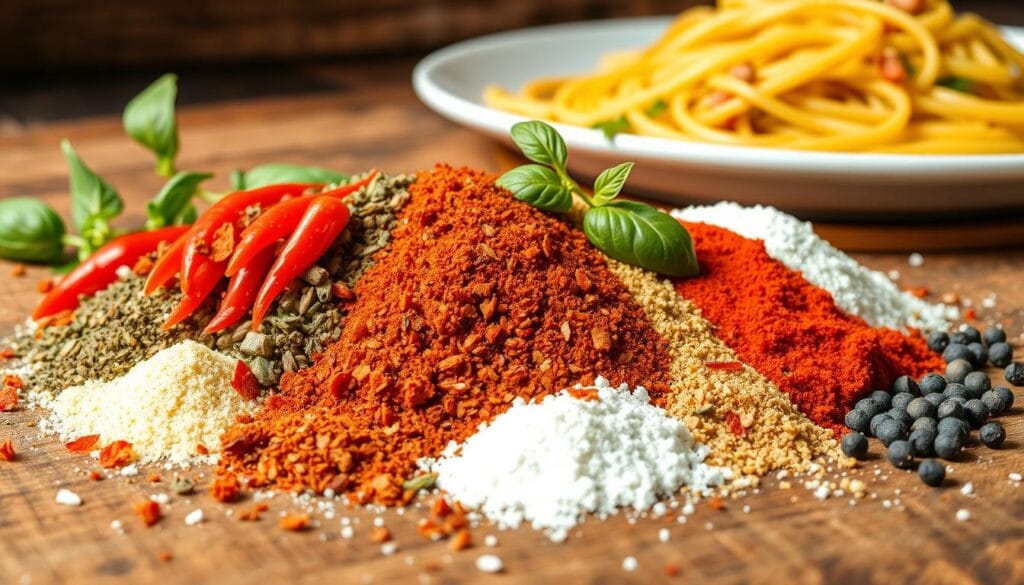
With the right mix of heat and spice, your spaghetti sauce will be both cozy and exciting. Enjoy the rich flavors and take your taste buds on a new adventure.
The Art of Layering Seasonings
Making a tasty spaghetti sauce is like an art. The secret is in layering seasonings carefully. By adding herbs and spices at the right times, you can create a mix of flavors. This will make your food spaghetti sauce a true masterpiece.
Timing Your Spice Additions
When you add seasonings is key to great flavors. Start by cooking onions and garlic. This lets the base flavors mix with the oil.
Next, add dried herbs like basil, oregano, and thyme early. This lets the flavors blend well, making a strong base for your sauce.
When your sauce is simmering, add fresh herbs like parsley or basil near the end. These herbs keep their flavor and aroma, adding a fresh touch to your sauce.
Building Complex Flavor Profiles
- Try different spices like fennel seeds, red pepper flakes, or cumin. They add depth to your seasoning in spaghetti recipe.
- Add a bit of sweetness with sugar or balsamic vinegar. This balances the tomatoes’ acidity.
- Adding red wine or Parmesan cheese at the end makes your food spaghetti sauce even richer.
By carefully layering and timing your seasonings, you’ll make a spaghetti sauce with amazing flavors. It will impress everyone with its taste.
Homemade Seasoning Blend Recipe
Take your spaghetti dishes to the next level with a homemade seasoning blend. This recipe mixes dried herbs and spices for a perfect base for your spaghetti sauce.
To make this versatile seasoning, just mix these ingredients:
- 1 tablespoon garlic powder
- 1 tablespoon onion powder
- 1.5 tablespoons dried oregano
- 3 tablespoons dried basil
- 1 tablespoon dried rosemary
- 1 teaspoon dried thyme
- 2 teaspoons black pepper
- 1 teaspoon dried sage
- 1 teaspoon red pepper flakes (optional, for added heat)
- A pinch of ground fennel seeds
Combine all the ingredients well in an airtight container. This seasoning in spaghetti recipe lasts up to 6 months. It’s a great way to add flavor to your best spices for spaghetti sauce.
The mix of garlic, onion, and herbs gives a balanced taste. It goes great with tomato-based sauces. You can tweak the amounts to match your taste.
“This homemade seasoning blend is a game-changer for my spaghetti sauce. The flavors are so much more vibrant and authentic compared to store-bought mixes.” – Chef Francesca, Italian Cuisine Expert
Make your spaghetti dishes stand out with this easy, versatile seasoning blend. The rich, complex flavors will impress your family and friends.
Storage and Shelf Life of Spaghetti Seasonings
Keeping your spaghetti seasonings fresh and flavorful is key. The right storage can make your spices and herbs last longer. This way, your spaghetti sauce will always taste great.
Store your seasonings in airtight containers in a cool, dry spot. Keep them away from sunlight. This stops moisture and light from ruining the flavors and smells. Homemade blends can stay good for up to 6 months this way.
Before using, shake the container to mix the spices well. For even longer storage, freeze them. They’ll stay potent for up to 6 months in the freezer.
| Spaghetti Seasoning Item | Shelf Life (Pantry) | Shelf Life (Freezer) |
|---|---|---|
| Dried Herbs | 3-4 years | 2-3 years |
| Ground Spices | 2-3 years | 3-4 years |
| Garlic/Onion Powder | 2-3 years | 3-4 years |
| Homemade Seasoning Blends | 6 months | 6 months |
By following these tips, your seasoning in spaghetti and spaghetti sauce seasoning will stay fresh. This will make your pasta dishes even better.
Common Seasoning Mistakes to Avoid
Seasoning is crucial for a perfect spaghetti dish. But, it’s easy to make mistakes that ruin the flavors. Avoid over-salting, too much oregano, or too much heat. These can overpower your spaghetti sauce.
Over-seasoning Solutions
Don’t worry if your seasoning is too much. There are ways to fix it. Add unseasoned tomatoes to soften the flavor or a bit of sugar to balance it. Make small changes and taste as you go until it’s just right.
Balancing Strong Flavors
Strong herbs and spices can take over if not balanced. Use them with ingredients that soften their edge. For example, mix intense oregano with fresh basil or a bit of cream. Taste and adjust as you cook to get the perfect seasoning.
Getting good at seasoning spaghetti takes time. But with these tips, you’ll make a seasoning in spaghetti recipe and food spaghetti sauce everyone will love.
Adapting Seasonings for Different Sauce Types
Seasoning is key to a great spaghetti dish. While some spices work for many sauces, you need to adjust for each one. Let’s look at how to season your spaghetti sauce for different types.
For a classic marinara sauce, use fresh herbs like basil, oregano, and parsley. These herbs add a bright, tomato taste. But, a hearty bolognese sauce needs meat spices like fennel, garlic, and onion powders for a deeper flavor.
When making creamy Alfredo sauce, add spices that go well with dairy. Nutmeg, white pepper, and a bit of garlic balance the sauce’s richness. This keeps the flavors light and smooth.
- For a spicy arrabbiata sauce, add more red pepper flakes for heat.
- A puttanesca sauce gets better with more garlic and salty anchovies or capers.
To adjust your seasoning, think about the sauce’s base and taste you want. Try different spice mixes and adjust the strength to enhance your spaghetti.
Conclusion
Learning to season spaghetti can make your homemade pasta dishes taste like they’re from a restaurant. Try different herbs, spices, and secret ingredients to find your seasoning in spaghetti. This will make your spaghetti sauce seasoning taste amazing.
It’s important to balance sweet and savory flavors. Also, add seasonings at the right times. And don’t forget to store your best spices for spaghetti sauce well to keep them fresh.
With these tips, you can make your spaghetti dishes even better. You’ll impress everyone with your Italian-inspired meals. Find your favorite seasoning in spaghetti blend and keep trying new things. Buon appetito!
Start your seasoning in spaghetti adventure and check out Virginia Boys Kitchens on Amazon. Use the promo code VBKBLOG10 for a 10% discount. They have great seasonings like the Complete Bougie BBQ Collection and Spring Party Essential Salts.
FAQ
What is the importance of seasoning in spaghetti sauce?
Seasoning is key to making spaghetti sauce taste great. It balances the acidity and enhances the flavor. This makes the sauce taste like it’s from Italy.
What are the essential dried herbs for seasoning in spaghetti?
Oregano, basil, rosemary, thyme, and sage are the main herbs. They give the sauce a true Italian taste.
How do garlic and onion powders impact spaghetti sauce flavor?
Garlic and onion powders add a deep, savory flavor. Getting the right amount is important for the best taste.
What are some secret ingredients that can elevate spaghetti sauce?
Adding sugar, carrots, instant coffee, baking soda, and nutmeg can enhance the sauce. They balance the acidity and add complexity to the flavor.
How can I properly layer seasonings in my spaghetti sauce?
Layering seasonings is important for complex flavors. Start with basic herbs and spices when cooking onions and garlic. Add dried herbs early, and finish with fresh herbs.
How should I store my spaghetti seasonings to maintain freshness?
Keep seasonings in an airtight container in a cool, dry place. Away from sunlight. Homemade blends last up to 6 months. Freezing can extend their life.
What are some common seasoning mistakes to avoid when making spaghetti sauce?
Avoid over-salting, using too much oregano, or adding too much heat. To fix it, add more tomatoes or a bit of sugar to balance the flavors.
How can I adapt seasonings for different types of spaghetti sauces?
Change the seasonings for different sauces. Use more herbs for marinara, meat seasonings for bolognese, and cream-friendly spices for Alfredo. Add red pepper flakes for arrabbiata. Experiment to find the right mix for each sauce.

